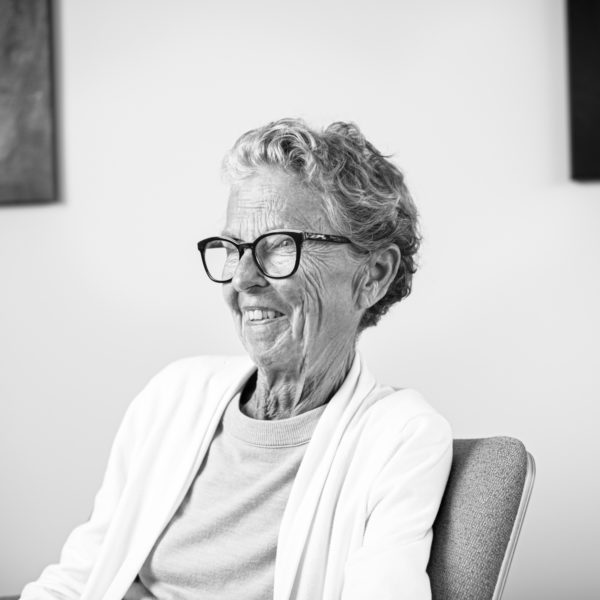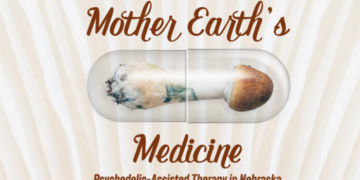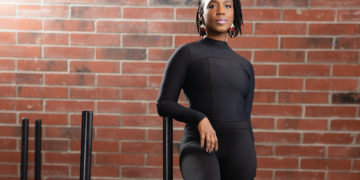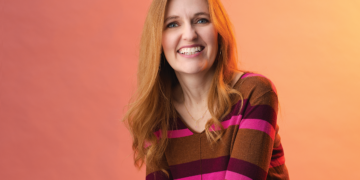Art is one of the most inclusive forms of expression. Carolyn Owen Anderson has dedicated nearly 20 years to helping an underserved population of seniors and people with developmental disabilities express themselves.
She is the executive director at WhyArts, the Omaha nonprofit dedicated to providing art to underserved populations. It’s a cause she can easily align with: she believes that everyone can benefit from a healthy dose of artistic expression, a belief that is realized in the organization’s slogan—“arts our way.”
“The general public see people with disabilities and think they don’t have talent, but I don’t believe that,” Anderson says. “Art is for everyone, and there is no right or wrong way to express your ability.”
As an organizational administrator, Anderson’s background is in psychology. She earned a master’s degree in counseling from the University of Northern Colorado in Greeley, which is helpful, as a large part of the job is observing people and matching artists’ skills with the organization’s needs.
“I think she has an eye for art, and she has a heart for people,” says longtime friend Nancy Williams, executive director of No More Empty Pots. “Her art is not in the traditional sense of artistry. Her artistic talent is pulling people together and giving them purpose through art.”
Anderson admits she has never been an artist, but that doesn’t keep her from attending arts events. She can be found watching productions by Omaha’s Blue Barn Theatre, Opera Omaha, or Omaha Symphony whenever she can.
Her passion for providing art to people of all abilities was ignited when she saw her adopted son struggle with academics.
“I got tired of him talking about what he couldn’t do,” Anderson explains. “People kept telling him what he would and would not achieve because his grades in math and science weren’t the best, but I knew he had potential. When he started concentrating on non-judgmental ways to do things he excelled.”
She first became acquainted with WhyArts 15 years prior as a contracted consultant. Anderson went on to focus her dedication towards an overlooked group of people—those of differing abilities—who could benefit from a non-judgmental way of expressing themselves. Throughout her years as director of the organization, she has helped include seniors in the arts and overseen several outdoor mural projects.
“Carolyn’s passion to connect and empower communities through the arts is an inspiration,” WhyArts teaching artist Sarah Rowe said via email. “As a working artist, I appreciate the challenge to help build creative experiences that strengthen the foundation of our city by uplifting individuals. Carolyn has a natural ability to coordinate events and connect people in a magical way.”
Along the way, Anderson has remained a consummate volunteer and philanthropist, a value instilled in her by her parents—Edward F. and Dee Owen. Dee, in fact, could be seen volunteering at the Omaha Community Playhouse into her 90s. Anderson herself serves on several boards, including No More Empty Pots and the Nebraska Writers Collective, and the board members and organizational leadership appreciate her work.
“She has a certain candor and brevity about things,” says Williams. “But you’ll know you have piqued her interest when she keeps digging more deeply. She’s been a good sounding board for moving things forward, or not moving them at all. She’s been supportive of not following status quo, but doing what she thinks is the right thing to do.”
r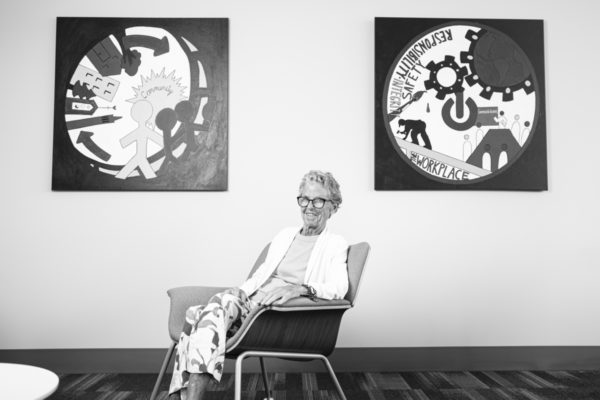 r
r
It is her position at WhyArts that has given her a special fondness for seeing talented artists working with people afflicted by various development disabilities.
“Our clients tend to have strong responses and genuine connections with our mentors,” Anderson says. “I love seeing seniors and people with special needs notice their artwork on the wall at one of our exhibits and saying, ‘Ooh, I didn’t think I could do that!’”
Williams not only works with Anderson at NMEP, she knew Anderson through a collaboration between Why Arts and Boys and Girls Club, where Williams was CIO.
“WhyArts gave the kids access to someone creative and who did creative work all day,” Williams said. “They got a chance to see how they can use their creativity and get paid for it. It was good for them to be able to share with artists and find a hobby, but also to be creative and give the kids feedback on that creative outlet.”
Artists interested in working with WhyArts don’t need prior experience with disabled learners, but they must undergo an extensive observation process under Anderson’s watchful eye. She finds most of them appreciate the individuality of their clients and are willing to work with the special needs population.
“Instructors need to have a bag of tricks since a structured curriculum can fall apart when teaching people with developmental disabilities,” Anderson says. “I find that most of my mentors have a great degree of compassion for our clients and appreciate the challenge.”
Under Anderson’s direction, WhyArts has flourished; bringing a variety of video animation, visual arts, literature, dance activities and more to over 43,000 individuals through 2500 workshops in 2018, in places ranging from senior centers to after-school programs. Partnerships with a host of organizations including MOSAIC, Ronald McDonald House Charities, and Sacred Heart School guarantee Anderson will continue encouraging creative thinking, creative play, and creative access to the arts for an underserved population of aspiring artists.
“I’m not a [practicing] therapist, but I’ll always believe that art is great therapy. It enables anyone to express themselves,” she says. “You may not be a Rhoades Scholar in math or science, but you could be a heck of a visual artist, which holds its own merit.”
r
For more information about WhyArts mission visit their website at www.whyartsinc.org.
rThis article was printed in the 60+ section of the September 2019 edition of Omaha Magazine. To receive the magazine, click here to subscribe.
